Celebration of Education Awards
Transformative Teaching Takes Center Stage
The Celebration of Education Awards recognize distinguished faculty members and educators for their outstanding contributions to the university, their commitment to students’ development and well-being and their impact through teaching.This year's honors took place on Tuesday, April 26 at a ceremony in the Cohon University Center. Congratulations to this year's award recipients!
Eric Grotzinger, Biological Sciences
Robert E. Doherty Award for Sustained Contributions to Excellence in Education
(nominated by Maggie Braun, John Hannon, Karen Stump, Fred Gilman, John Mackey and Curtis Meyer)
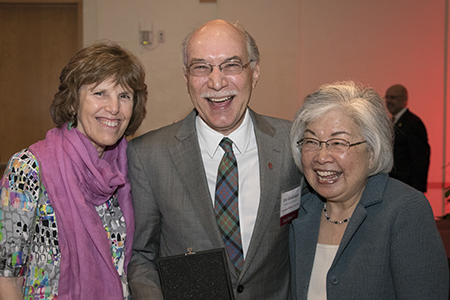
Eric Grotzinger with his wife, Shelley, (left) and longtime friend and
colleague Nancy Ho.
Eric Grotzinger's impact on students has been so great, alumni are still writing letters of support for him 30 years later.
"Never before or since have I observed an adviser take on this role so wholeheartedly and enthusiastically," one alumnus said.
"Eric's interest in the undergraduates he stewards does not cease after graduation. He and I have stayed in close touch throughout my graduate, post-doctoral and professorship years," wrote another.
As associate dean, Grotzinger served on a number of university advisory committees and advised students and staff in each of the university's four colleges. His ability to ignite enthusiasm in others has made him a role model for all of the Mellon College of Science (MCS).
Grotzinger has not only had a direct impact on students, he has had a large and sustained role in MCS' educational mission.
"It's hard to think of any educational initiative within MCS that does not have Eric playing a large role and making sure that things are going smoothly," his colleagues wrote in his nomination letter. "It is fair to say that there is no part of undergraduate education in MCS that has not been touched by Eric, and is better because of it."
Grotzinger chaired the new MCS Core Education Committee, establishing the measurable competencies and experiences that every MCS student should have upon graduation. The new core education rolled out this past fall with an emphasis on the student as a scholar, professional, citizen and person.
J. Andrew Bagnell, Robotics Institute and Machine Learning
William H. and Frances S. Ryan Award for Meritorious Teaching
(nominated by Reid Simmons, Martial Hebert and Matthew T. Mason)
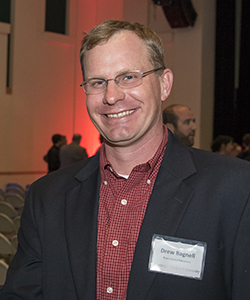
Drew Bagnell
Drew Bagnell is always on the lookout for innovative ways to enhance the educational experience at CMU.
An associate professor in the Robotics Institute, National Robotics Engineering Center and Machine Learning Department, Bagnell saw the need for a graduate-level course geared toward robotics with a focus on statistical techniques, such as machine learning and optimization. The course he developed in 2006, Statistical Techniques in Robotics, is wildly popular, primarily because of Bagnell's teaching style.
"He prepares meticulously crafted lectures, presenting difficult material in a very accessible way," wrote his nominators. "He gives a lot of personal attention to students, both in and outside of class. His class notes are widely circulated and we understand are used by other faculty, at various institutions, in preparation for their lectures."
Since then, he has developed two more well-received advanced graduate courses.
"Drew is a demanding but very fair, instructor," his nominators wrote. "His courses are consistently highly rated and his Statistical Techniques course is almost treated as a required course by many of the robotics students."
Bagnell has mentored six post-doctoral fellows, two of whom now work at Carnegie Mellon.
"Despite — or maybe because of — his demanding style, he is a very popular choice for serving on student's thesis and qualifying committees," his nomination letter reads.
Bagnell has designed, marketed and led the highly competitive Robotics Institute Summer Scholars (RISS) program. Now in its 10th year, the program matches students with faculty for on research projects.
"Part of the measure of the success of the RISS program is the several dozen alumni of the program who have subsequently been accepted into the robotics graduate programs," his nominators wrote. "Much of the credit for the success of the program goes to Drew's foresight and dedication."
George Kantor, Robotics Institute
Mark Gelfand Service Award for Educational Outreach
(nominated by Theresa Richards, Patricia Rote, Thomas Pope, Joseph Jackson and Chuck Whittaker)
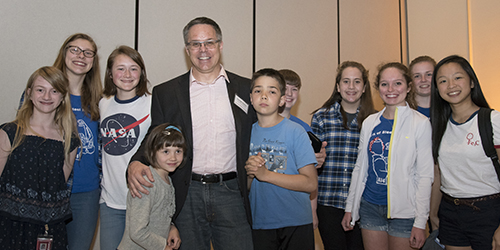
George Kantor with his children (center) and Girls of Steel.
George Kantor has been at the heart of CMU outreach efforts in Pittsburgh and beyond.
A researcher and educator at the Robotics Institute, Kantor has spent countless hours volunteering as the lead mentor of the Girls of Steel FIRST® team. FIRST — For Inspiration and Recognition of Science and Technology — runs a high school contest where teams have six weeks to design and build a game-playing robot.
Girls of Steel has participated in competitions in Pittsburgh, Washington, D.C., Cincinnati and Cleveland, winning multiple awards and qualifying for the world championship competition in St. Louis five times. Recently, they won the Entrepreneurship Award at the Greater Pittsburgh Regional Competition and the Engineering Inspiration Award at the Queen City Regional Competition.
"An impressive aspect of George's continued leadership and outreach is the extent to which he has been able to bring together members of the Carnegie Mellon community to participate with Girls of Steel," his nominators wrote. "Among the many volunteers are students, faculty and staff from Tepper, Heinz College and Computer Science. These volunteers help make Girls of Steel a resounding success and have made the CMU robotics community stronger as a result."
The Girls of Steel team comprises 65 girls from 31 schools. Kantor is involved everything from teaching technical skills to fundraising with the team.
While his accomplishments with Girls of Steel are central to his nomination for the Gelfand Award, his nominators also pointed to his research and teaching.
Kantor and other faculty members developed low-cost airboats for use in flood disaster mitigation and water sampling in underdeveloped countries. In collaboration with local teachers, he is working to develop projects that use the airboats in classes in area high schools as a way of introducing mobile robotics to students and getting kids excited about robotics in general.
Kunal Ghosh, Physics
Award for Outstanding Contributions to Academic Advising and Mentoring
(nominated by Ryan Davis, Isabelle Goldstein, Stephen Garoff and Helmut Vogel)
Kunal Ghosh has a passion for advising students.
As assistant head of undergraduate affairs and a teaching professor in the Department of Physics, he is the primary adviser for physics majors starting when they declare their majors through their third semesters.
Since he arrived at CMU in 2001, he has focused on helping students become well-rounded, healthy human beings. And he delivers this message to the students in a non-judgmental, non-coercive — yet compelling — way.
For students in distress — be it academic or personal — he puts every ounce of his energy into helping them. He is proactive, asking faculty to identify students showing signs of problems and then he seeks the students out. He schedules meetings with them to work through their concerns.
Ghosh takes advantage of every university resource available to help students. For academic problems, he will work with the student for as long as they will come to the meetings. For problems that involve physical or mental health, he does not stop until he knows the student is safe.
"There is no doubt he has saved large numbers of students' academic careers, and possibly some lives as well," nominators wrote. "Student letters speak clearly to the way Kunal has met the most critical yet most difficult advising challenges."
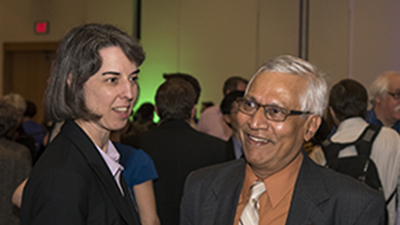
Lynn Walker (left) with Kunal Ghosh.
Ghosh's community-building includes his fostering and running of several clubs for physics students. His Physics Upperclass Course Center helps physics majors with any course and emphasizes the importance of students helping each other.
"There is no doubt that this community along with Kunal's advising is largely responsible for our undergraduate physics program being one of the largest in the country," nominators said.
Ghosh serves on many MCS and university committees. Since 2007, he has participated in CMU's "Big Questions" discussions, interactive sessions aimed at helping students identify and develop personal values in a safe environment among peers.
Lynn M. Walker, Chemical Engineering
Barbara Lazarus Award for Graduate Student and Junior Faculty Mentoring
(nominated by Shelley L. Anna, John R. Kitchin and Kathryn A. Whitehead)
In the words of her nominators, Lynn Walker is a natural mentor.
Walker has been a professor of chemical engineering at CMU since 1997. In her research group, she has advised more than 32 undergraduate students, 11 master's degree students, and 21 Ph.D. students, many of whom are women and under-represented minorities. These students have earned coveted jobs at major chemical companies and universities, in no small part due to Walker's behind-the-scenes efforts.
Walker is known for giving her students ample opportunity to direct their own thesis projects, pushing them to propose new ideas, to find out which scientific questions interest them most and to develop rigorous research plans. This approach has served her students well, with many earning positions and growing into leadership roles at major companies.
Walker has won the Chemical Engineering Department's Kun Li Award for Excellence in Education twice — a rare accomplishment. The award is voted on by the senior class and presented to the faculty member who most positively influenced their undergraduate experience.
"Few students could have claimed not to have connected with Lynn in some way outside of lecture," wrote one student, citing late-night visits by Walker to the computer lab adjacent to her office.
Walker has gone out of her way to ensure young faculty settle in comfortably, both to their professional pursuits at CMU and their lives in Pittsburgh. She has been known to lend tools and painting supplies, to lend a hand with home repairs and moves, and she hosts regular "Campfires with Lynn" and other informal gatherings in which junior faculty can feel at home to talk about stresses, lament failures and celebrate successes.
"Her support of junior faculty goes well beyond just having coffee, which she also will happily do any hour of any day," her nominators said.
Maralee Harrell, Philosophy
Teaching Innovation Award
(nominated by David Danks)
A significant challenge in philosophy courses is learning how to read and critically analyze philosophical arguments.
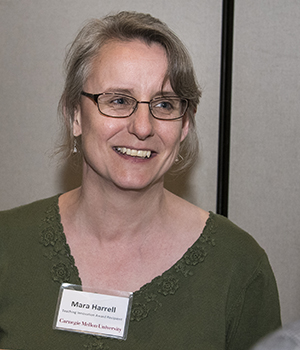
Maralee Harrell
Associate Teaching Professor Maralee Harrell is being honored with the Teaching Innovation Award for her development and implementation of argument diagramming as a central tool in teaching Introduction to Philosophy.
Harrell was not content with students' reports that argument diagramming was useful in this and other courses. Instead, she designed a series of studies involving pre- and post-testing of students in different course sections taught in different ways.
Those studies revealed a large positive impact of argument diagramming: students who were taught to read, construct and use argument diagrams showed significant improvements in a range of critical thinking skills — particularly understanding, evaluating, creating and analyzing arguments.
Argument analyses and critical thinking skills are not exclusive to philosophy, so Harrell has worked closely with Danielle Wetzel to incorporate argument diagramming into the English Department's "Interpretation and Argument" course. As in the philosophy course, pre- and post-testing showed argument diagramming significantly improves writing skills, particularly the quality, clarity and detail of students' arguments.
"Introductory philosophy courses are notoriously difficult to teach so that students acquire key skills, rather than just rote knowledge of various philosophical theories," wrote David Danks in her nomination letter. "Mara's development and use of argument diagramming in Introduction to Philosophy has provided a significant advance in our ability to succeed at this goal."
Christopher M. Jones, Modern Languages
Teaching Innovation Award
(nominated by Nevine Abraham, Susan G. Polansky, Therese Tardio, G. Richard Tucker, Sue-mei Wu and Bonnie Youngs)
Chris Jones has played a key role in the design, development, implementation and dissemination of Elementary French I and II Online, at CMU and elsewhere through the Open Learning Initiative.

Chris Jones
Over the 16 years since the course's inception, Jones has built on the French course model and design process to lead the development of similar programs in Spanish, Chinese and Arabic in the Department of Modern Languages. His contributions have put CMU on the map for its hybrid, online language courses.
Beginning with French, Modern Languages' programs in online learning grew in part out of a response to requests by students whose program demands hindered them from taking courses that meet four times per week.
Jones has been responsible for design and administrative oversight for all online programs in collaboration with faculty content creators and support staff.
"Modern Languages' online courses are hybrid models, designed for students to work online and also to meet in weekly sessions with an instructor and language assistant for further development of their skills," his nominators wrote. "French Online is the most developed, widely used and researched of the programs. It has since been used by thousands of independent learners and dozens of institutions, from high schools to universities across the country."
Research focused on the learning outcomes of French Online has demonstrated that students who continue their studies transition well into regular classroom-based courses.
Jones has achieved international recognition for his leadership in technology-enhanced language and culture learning.
"Even more important than the unarguable pedagogical excellence of the materials, in my opinion, is the thoughtfulness and professional integrity with which Dr. Jones has written about the challenges of developing such materials, of preparing and supporting the teachers who use them, and of educating and supporting the students who use them," one colleague said.
Art, Conflict and Technology in Northern Ireland Team: Jennifer Keating-Miller, Dietrich College; John Carson, School of Art; and Illah R. Nourbakhsh, Robotics Institute
Team Teaching Innovation Award
(nominated by James Duesing)
Through "Art, Conflict and Technology in Northern Ireland," Jennifer Keating-Miller, John Carson and Illah Nourbakhsh introduced students to a history of social strife and reconciliation efforts in North Ireland from the 1960s to the present.
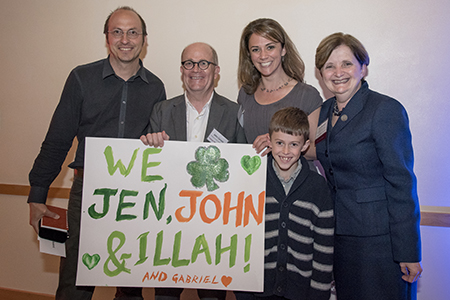
Amy Burkert (right) poses with the winning Teaching Innovation
Award Team: (l-r) Illah Nourbakhsh, John Carson, Jennifer
Keating-Miller and her son Liam.
Keating-Miller from the Department of English; Carson from the School of Art; and Nourbakhsh of the Robotics Institute co-taught the course, which considered the influence of technological advances on how narratives are shared within a community and around the world.
During class, students reflected on and analyzed a variety of literary and visual art sources from the time period and learned how to create mixed-media projects using Gigapan and Hear Me systems from CMU's CREATE Lab.
The class was far reaching in its approach, cross‐listed in three colleges where it attracted students from many majors in the university and supported by a variety of sources. The faculty worked with an assortment of resources to fund a Spring Break 2015 field trip to Belfast, where they met a variety of writers and artists whose work they studied and stakeholders in reconciliation efforts throughout the region.
Frankenstein, Newstead Earn Graduate Student Awards
Will Frankenstein and Clive Newstead are this year's Graduate Student Service and Teaching Award winners, respectively.
Frankenstein, a Ph.D. candidate in engineering and public policy, was vice president for external affairs of the Graduate Student Assembly last year and is a founding member and past president of Allies Grad, CMU's graduate group for LGBTQ students. He served as the 2015 Northeast Regional Chair for the National Association of Graduate and Professional Students.
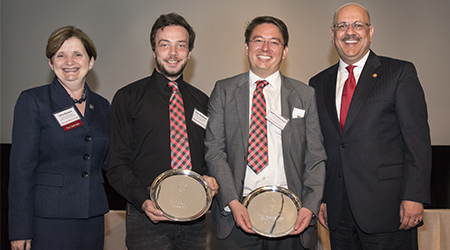
Clive Newstead (center left) and Will Frankenstein (center right) with
Amy Burkert and Farnam Jahanian
Newstead is a Ph.D. student in mathematical sciences, who has served as a TA and instructor for several undergraduate courses. He is a fellow at the Eberly Center for Teaching Excellence and Educational Innovation, where he applies principles from pedagogical research to support the professional development of other graduate students.
Learn more about Frankenstein and Newstead.
